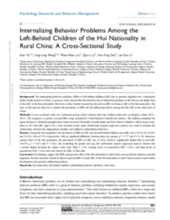In recent decades, with the continuous development of China’s industrialization and urbanization, millions of migrant workers have moved from rural areas to cities to improve the circumstances of their families and children. However, due to the restrictions of domicile control and urban public resources, these migrant workers need to leave their children in their hometown to attend school. Therefore, a special population of left-behind children (LBC) has been created. LBC have been defined as children <16 y old who stay in their hometown and are taken care of by their grandparents, relatives, neighbors, one parent, or siblings or take care of themselves for more than six months each year while one or both of their parents migrate to an urban area for work.
The internalizing behavior problems (IBPs) of LBC due to parental migration are a widespread public health concern in China. A previous study showed that the detection rate of behavioral problems in the Hui was far higher than in the LBC of the Han nationality. However, to date, limited research has focused on IBPs in Chinese LBC of the Hui nationality. The aims of this present study are to explore the prevalence of IBPs and the influencing factors among the Hui LBC in the rural areas of China.

